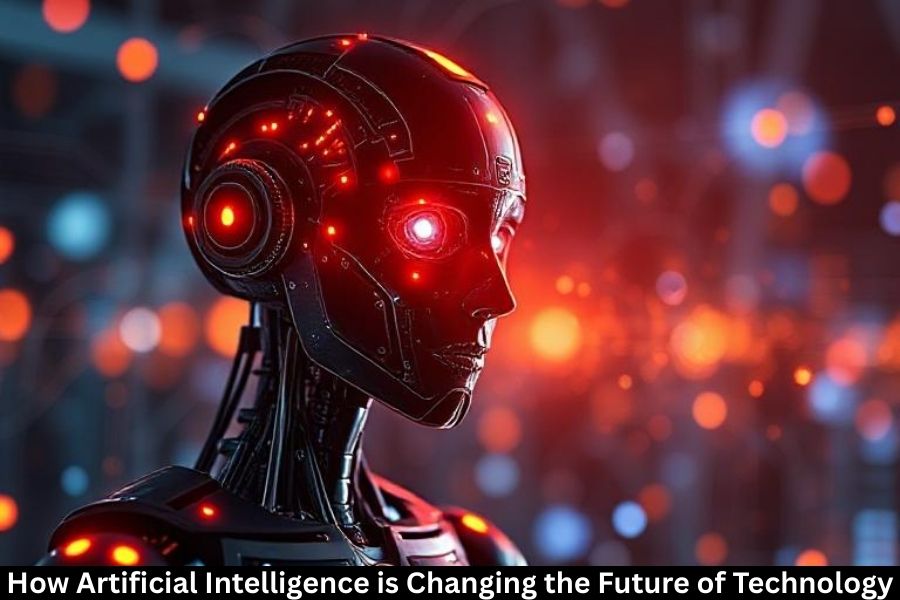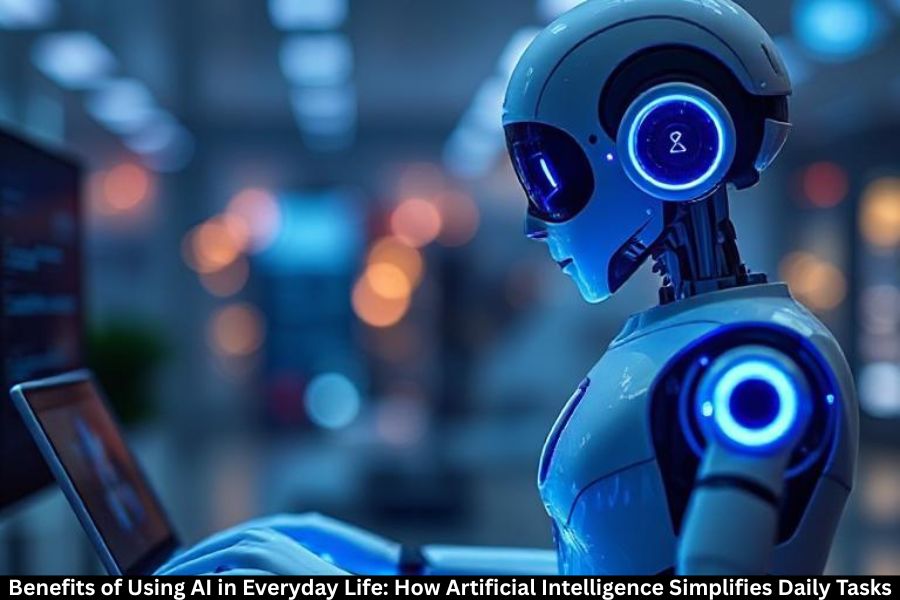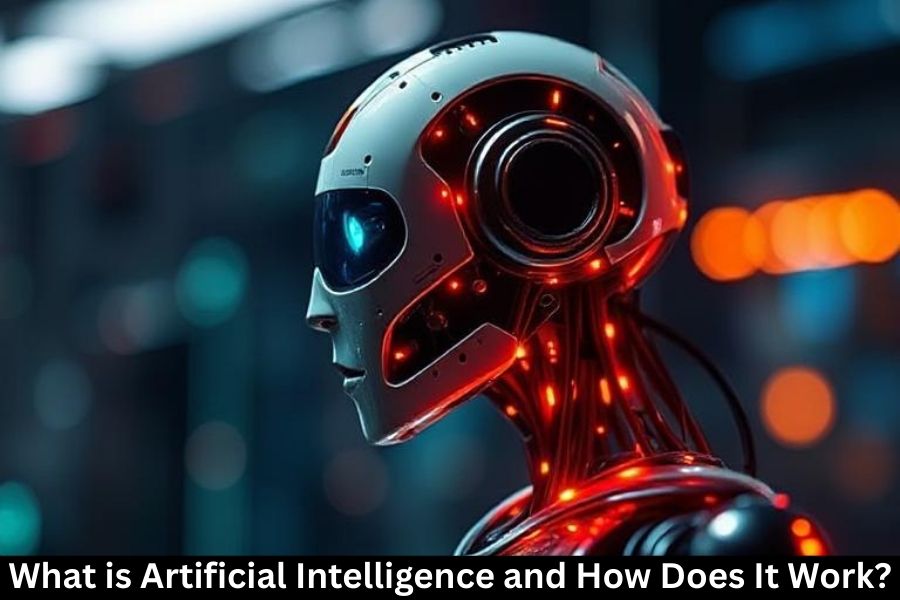Artificial Intelligence (AI) is no longer a mere idea depicted in science fiction movies, but rather, a significant phenomenon influencing the way we operate, live, and engage with technology. From instructing Siri to play a tune to doctors employing AI-powered tools to identify illnesses, the technology is reshaping the world we live in. What specifically makes AI powerful technology, and in what way will it impact the future, is what I intend to explore.
What is Artificial Intelligence?
Artificial Intelligence at a high level objective is the capability of a machine to carry out tasks that can be reasoned as human intelligence. Its goal is to teach computers to reason, and learn, and make decisions. Its key components include:
- Machine Learning (ML): Training a machine to identify patterns and learn from data.
- Deep Learning: An advanced form of ML inspired by the human brain’s neural networks.
- Natural Language Processing (NLP): The branch of AI that deals with the understanding and communication to humans in simple language.
As a concept, AI means providing machines with a brain capable of “learning” and “evolving.”
The AI Boom in Daily Life
Without realizing it, you are already surrounded by AI.
- Smartphones: Face recognition, voice assistants, and predictive typing.
- Smart Homes: Alexa or Google Home, which can control lights, music, and even your thermostat.
- Streaming Apps: Netflix and Spotify, employing AI for recommending shows and songs personalized to individual users.
AI has smoothly become a part of our daily lives, enhancing and personalizing it.
AI in Business and Industry
Firms are adopting AI in a bid to improve efficiency.
- Automation: Use of AI to perform dull tasks that helps reduce human strain.
- Predictive Analytics: Assisting companies in forecasting demand and strategy planning.
- Supply Chain: Enhanced logistics that guarantee expedited deliveries at lesser costs.
For instance, Amazon’s AI-enabled warehouses utilize robots to efficiently handle tens of thousands of products.
AI in Healthcare
The impact of AI in healthcare is revolutionary.
- Early Diagnosing: AI tools assist in the detection of diseases, like cancer and other cancers, on scans and other tests much earlier than humans.
- Surgical Robots: Aid physicians in performing exact operations.
- Personalized Medicine: AI customizes treatment plans based on a person’s genomes.
Envision the era where your smartwatch notifies you about a health issue before it’s critical—this is AI in healthcare.
AI in Education
Education is evolving with the aid of technology.
- Adaptive Learning: Catering to an individual learner’s strengths and weaknesses.
- Virtual Tutors: Chatbots to answer queries and mentor students.
- Teacher Aid: AI assesses students’ work and helps in lesson improvement analytics.
It’s akin to having a personal tutor accessible every hour of the day.
AI in Transportation
Transportation is undergoing an evolution towards greater efficiency and safety.
- Autonomous Vehicles: Tesla and other companies are developing full autonomous cars.
- Traffic Systems: Decreasing congestion through traffic flow prediction.
- Logistics: Optimizing delivery routing through AI.
Perhaps in the near future, your daily commute will be akin to being driven around by a robotic chauffeur.
AI in Entertainment
Entertainment is not left behind.
- Streaming: Netflix and YouTube utilize AI to tailor content recommendations.
- Gaming: The use of AI rivals in games to elevate the challenge and realism.
- Content Generation: Automated music composition, art creation, and even movie script drafting through AI.
The human-AI alliance in creativity is unveiling novel horizons.
AI in Finance
Money and AI are a powerful duo.
- Fraud Detection: AI identifies strange transactions in bank accounts.
- Robo-Advisors: Provide algorithm-based financial guidance.
- Trading Systems: Utilize AI for fast and accurate trades.
Besides saving money and time, this also lessens human mistakes.
AI and Cybersecurity
Cybersecurity threats are escalating, and AI took action.
- Threat Detection: AI scrutinize networks for unusual activities.
- Automated Response: Fast mitigation of cyber-attacks.
- Data Protection: Bolstering digital security infrastructures.
Think of AI like a virtual watchdog for your cyber space.
AI in Agriculture
Farming is evolving as well.
- Smart Sensors: Evaluate soil, water, and crops.
- Crop Prediction: AI anticipates yields and prevents waste.
- Sustainable Farming: AI helps reduce chemical usage and improve productivity.
AI ensures the planet can be nourished without depleting resources.
AI and the Future of Work
Is there a risk that robots will assume our roles? That question remains.
- Job Automation: New roles will be introduced to replace the few that will be lost.
- Career Prospects: New AI specialists, such as engineers and data scientists.
- Upskilling: Workers need to acquire AI-related skills.
Think of AI as re-defining the job market, as opposed to eliminating it.
Ethical Issues Around AI
With powerful technologies, challenging questions emerge.
- Bias: An AI may intentionally or unintentionally perpetuate discrimination.
- Privacy: The misuse of vast databases AI has access to.
- Decision Making: For instance, should a life-changing decision involving healthcare or transportation be taken by a machine?
In order to ensure equitable access to damages, a delicate balancing act between innovation and ethics is required.
AI’s Future Potential
The future is really exciting.
- Space Exploration: AI aids astronauts with navigation and data analysis of far planets.
- Scientific Discoveries: AI speeds up research in physics, biology, and chemistry.
- Human-AI Collaboration: Tackle global problems together.
Humans versus AI is not the challenge of the future, rather it is humans with AI.
Conclusion
AI is transforming the way that we approach problems. From healthcare to road safety to education, personalized learning is a reality. AI is driving the future. It is true that the field presents some ethical issues, such as worry for jobs and the way that they will be transformed, but the fact remains that AI will be an essential factor in the future AI will help in solving any problems the world will be encountering.
FAQs
Can AI take over all the jobs currently done by humans?
No, AI will take over low-level, monotonous tasks. In addition, new roles will be created in marketing, data analytics, customer relations, social media, and other sectors.
Are AI-driven self-driving vehicles safe?
They are progressing rapidly. However, safety is dependent on testing, regulations, and responsible public use.
Can AI think like a human?
No. Although AI can imitate some thinking functions of a human, it doesn’t possess emotions, self-awareness, or genuine comprehension.
Which industries stand to gain the most from AI?
There are already significant transformations occurring in healthcare, finance, education, transport, and entertainment.
What can people do to get ready for a future led by AI?
People can get trained in digital literacy, data analysis, and AI technologies to ensure they remain employable.


